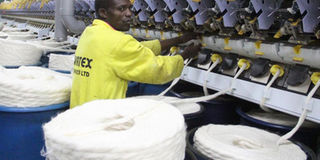Breaking News: At least 10 feared to have drowned in Makueni river
Cotton firm appeals to farmers to increase acreage

A staff at work at Rift Valley Textile on April 9, 2014. The company has a shortage of raw materials. PHOTO | JARED NYATAYA | NATION MEDIA GROUP
What you need to know:
- Prof Kipkurgat disclosed that the company is producing an average of 10,000 bales of cotton against a capacity of 70,000 annually.
- In 2015 the National Assembly approved Sh500 million to fund the purchase of new equipment.
The Eldoret based Rift Valley Textile (Rivatex) East Africa is operating below capacity due to acute shortage of raw materials.
Managing Director Thomas Kipkurgat disclosed that the company is producing an average of 10,000 bales of cotton against a capacity of 70,000 annually.
"Severe shortage of cotton has impacted negatively on our operation," Prof Kipkurgat said and added that the firm has invested more than Sh300 million in upgrading its machines so that products that meet international standards can be produced.
The textile firm was bought by Moi University Research Centre in 2007 after it was placed under receivership on May 25, 1998.
In 2015 the National Assembly approved Sh500 million, courtesy of the Ministry of Industrialisation and Enterprise Development, to fund the purchase of new equipment; which would facilitate increase in productivity to generate more income.
Prof Kipkurgat said the company has embarked on aggressive marketing to sensitize farmers in cotton growing areas to increase acreage.
"Famers in cotton growing regions need to increase their production and supply us with more raw materials to sustain our annual operations," he appealed.
Some of the targeted areas are Mogotio, Teso, Busia and Bura.
The company has acquired 250 acres of land in Mogotio, where farmers will be taught how to grow better-yield cotton.
Farmers in North Rift have petitioned the government to set up a stabilisation fund to offer them guaranteed market and better returns.
They said the fund would cushion them from unpredictable prices and trigger increased productivity to sustain steady supply of yarn to the textile industry.
"Steady market and allocation of adequate funds to invest in modern production techniques will result in increased cotton production and cut down on costs of importing the raw material," Mr James Yatich from Salawa, Baringo County, said.
The Ministry of Agriculture also started a marketing campaign to promote cultivation of cotton in Kerio Valley through supplementary irrigation schemes.






